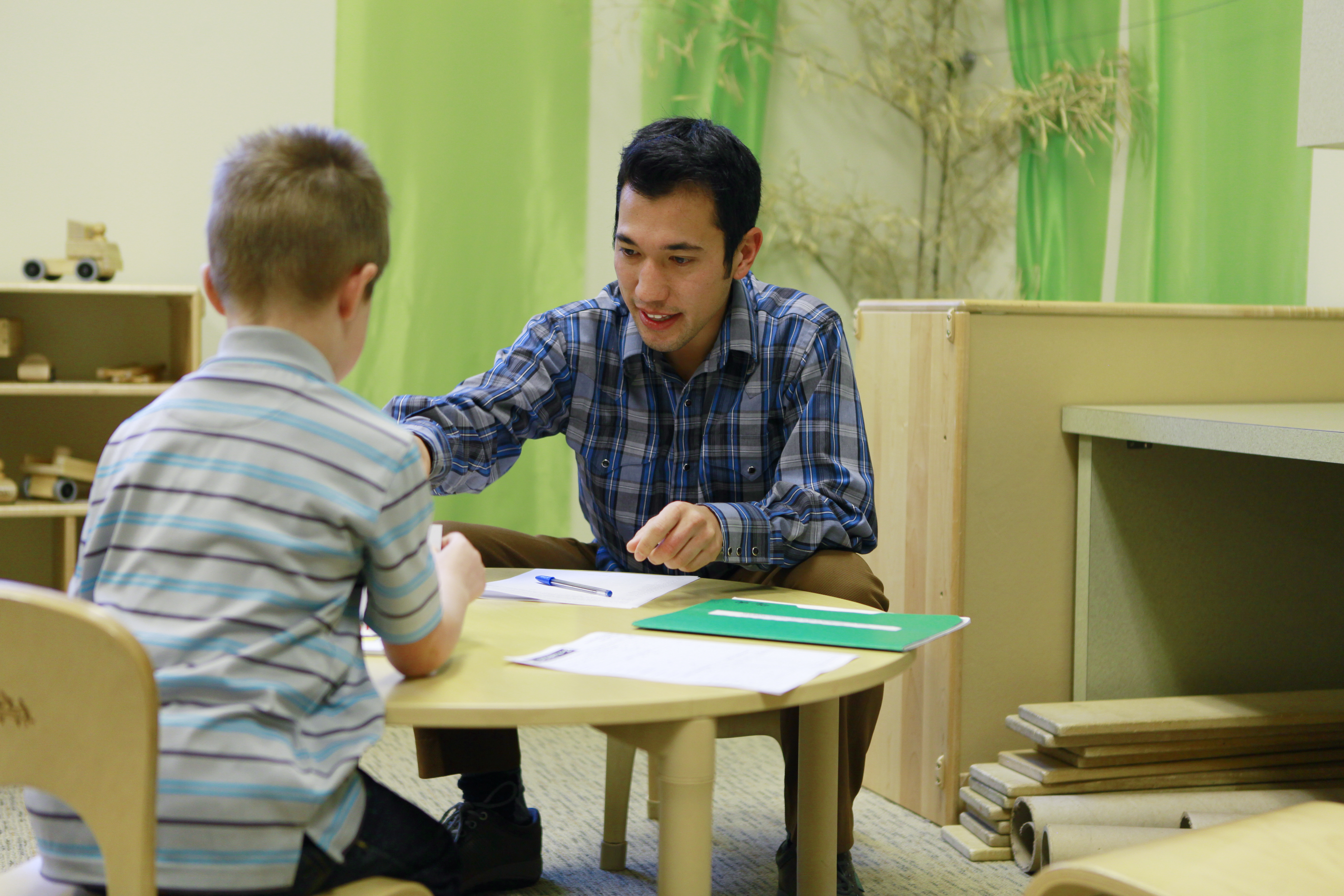Start a Rewarding Career as a Speech-Language Pathologist

Make a difference in the lives of others by treating a wide variety of communication and swallowing disorders with a graduate degree in speech-language pathology from Pacific.
Ready to begin your journey as a speech-language therapist? Applications for Pacific's innovative two-year SLP program open this fall, so browse admissions requirements and prepare your materials today!
Whether helping those impacted by aphasia, assisting trans persons in finding their true voice, or working with disabled persons on adaptive communication skills, speech-language pathologists (often called SLPs or also speech therapists) have the opportunity to help many people.
Beginning with a master’s degree in speech-language pathology, the path to becoming a speech therapist requires complex problem solving and the ability to form intimate personal connections with those in need.
Required for professional certification, speech therapy school combines the medical foundations of health science and hands-on training with those experiencing communication and swallowing impairment.
And getting started is easier than you think. Join us as we guide you through each step on the process of how to become a speech therapist.
Step 1: Get Your Bachelor’s Degree
Most speech pathology schools (including Pacific) require a completed bachelor’s degree, though it doesn’t need to be in communication science if the required prerequisite courses have been taken.
The required coursework for speech therapy school is heavily based in math and science, with an emphasis on healthcare, so the best bachelor degrees for speech pathology focus on those areas.
Some undergraduate degrees well suited to SLP school include:
-
Pre-Speech-Language Pathology. Taken alongside a related degree—such as public health or social work—a pre-professional pathway can easily meet the requirements for speech therapy school and provide hands-on training opportunities.
-
Communication Sciences and Disorders. As either a major or minor degree, communications sciences and disorders (CSD) coursework uniquely prepares students for the kinds of healthcare practiced by certified speech therapists.
-
Natural Sciences. Degree paths in biology and chemistry provide a foundational background in math and science, something many SLP schools emphasize and prioritize when evaluating applicants.
-
Disability Studies. Many patients of speech-language pathologists seek ways to adapt their communication skills through treatment of permanent or temporary disability.
Fulfill Speech Therapy Prerequisites with a Post-Baccalaureate Program
Designed to help those interested in speech therapy school gain the necessary prerequisites, Pacific’s flexible post-bacc program in communication sciences and disorders—available in-person, hybrid, or entirely online—makes filling the gaps in your application easy.
Whether you need to start a CSD pathway from the beginning or are just looking for those last few courses to apply to master’s programs, post-bacc programs are ideal for those who want to attend SLP school while still getting an undergraduate degree in another discipline.
Step 2: Prepare Your Speech Therapy School Application
Prerequisites are only one facet of a successful speech pathologist school application.
Most schools also require a minimum amount of hours spent observing certified speech therapists in a clinical setting.
This can be done while still pursuing your undergraduate degree, and allows for real-world experience coming into graduate school.
Professional references are also a key aspect of many applications, and can be taken care of while still in school.
Professors, mentors, and shadowed clinicians are all good examples of the kinds of working healthcare professionals who can champion your passion for speech therapy school through letters of recommendation.
The Graduate Record Examinations (GRE) is at times needed alongside a graduate school application. However, for the 2024-2025 admissions cycle, Pacific will not require GRE test scores.
Step 3: Research Speech Therapy Programs and Apply

The best speech pathology schools enable students to graduate on time and with a high level of success on the exam for speech therapy certification.
Students who graduate from Pacific’s speech language pathology program consistently pass the Praxis exam above the national average.
When researching schools, also look for programs that include a clinical simulation in addition to a clinical externship.
Clinical simulations, like those at Pacific, allow speech therapy students to practice healthcare techniques—treating everything from stutters to swallowing disorders—in a controlled, risk-free environment.
Once you’ve completed researching SLP programs that fit your needs and career pathways, the only thing left to do is apply.
The Communications Sciences and Disorders Centralized Application Service (CSDCAS) allows you to submit multiple applications at once using their extensive database of speech therapy master’s programs.
Step 4: Get Accepted and Take Advantage
Congratulations, you’ve gotten in! Getting accepted to SLP school is the first step to becoming a healthcare professional who can make a difference in your community and beyond.
Here’s what you can do to make the most of your time in speech therapy school:
-
Join clubs. Chapters of both pre-CSD clubs and the National Student Speech-Language Hearing Association (NSSLHA) exist at Pacific. Involvement in these clubs not only puts you in direct contact with working professionals in your area, but can also create volunteer opportunities to grow real-world skills.
-
Partner with faculty. Finding professors and researchers who share your passions can mean participating in cutting-edge projects and discovering a unique specialty after graduation.
-
Get out in the community. From working with groups on campus to helping those impacted by communication disorders in nearby communities, SLP school offers plentiful opportunities to make a difference while still in school.
Step 5: Become a Certified Speech-Language Pathologist
After completing a speech therapy master’s program, the last things to do before you can begin your career as an SLP are to pass the Praxis exam and apply for certification.
The Praxis Exam is a standardized test given by the American Speech-Language-Hearing Association (AHSA) that determines whether or not a SLP school graduate is knowledgeable enough to administer care.
After passing the exam (Pacific graduates pass at a rate over 95%) all that remains is to apply for certification. After that, you’re on your way to making a difference in the lives of others.
Pacific speech therapist alumni enter the workforce ready to make a real impact. See how our clinical simulation programs prepare grads to jumpstart their career.


